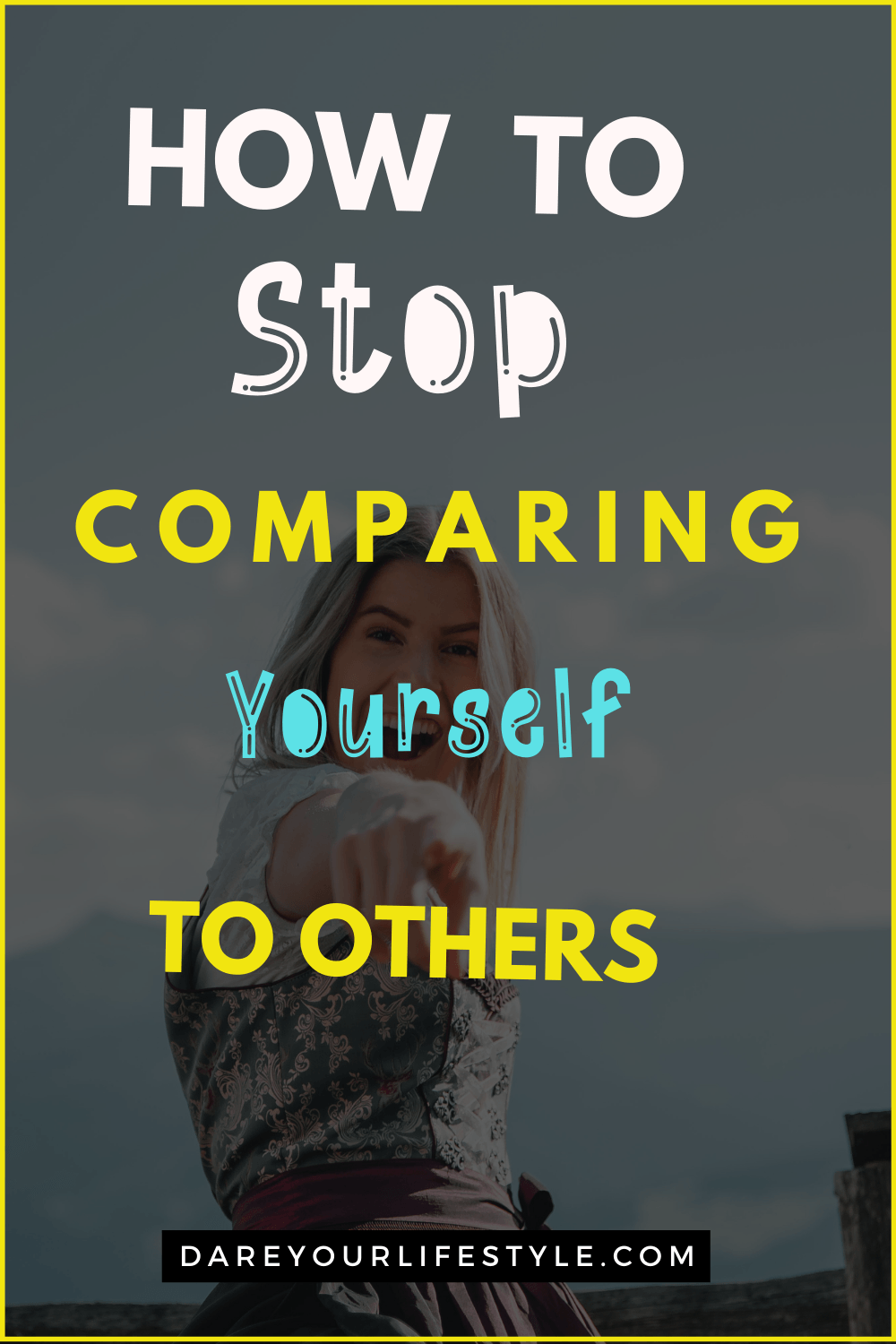Disclaimer: This post may contain affiliate links, meaning we get a small commission if you make a purchase through our link at no extra cost to you. For more information, please visit our Disclaimer Page.
The 3 AM thoughts that make you question everything. The scroll that steals your joy. The constant wondering if you’re enough.
Everywhere you look, someone else seems to be doing better, faster, or louder than you.
That constant pressure makes it hard to simply live your own life without checking where you stand.
It’s why learning how to stop comparing yourself to other people matters more than ever.
Comparison steals joy, drains your energy, and tricks you into believing you’re not enough.
But you were never designed to run someone else’s race.
The truth is, your story carries meaning on its own without being measured against anyone else’s timeline.
In this post, we’ll cover practical steps to break free from unhealthy comparisons.
We’ll talk about where comparison starts, how to stop feeding it, and how to shift your focus back to your own growth.
Because the moment you stop looking sideways, you finally see what’s right in front of you.
Key Takeaway
- Your Brain is Wired to Compare – Research shows comparison activates reward circuits in your brain, making it a natural but potentially harmful habit that social media amplifies into overdrive.
- Comparison Steals Your Mental Health – Studies link heavy social media comparison to lower self-esteem, increased depression, and anxiety, especially when you compare yourself to people who seem “better off.”
- Create Boundaries, Not Willpower Battles – Instead of trying to resist temptation, remove it by unfollowing trigger accounts, setting app timers, and creating “no-scroll zones” in your daily routine.
- Compare with Past-You, Not Others – Track your own weekly progress and growth rather than measuring yourself against other people’s highlight reels and curated content.
- Use Faith as Your Anchor – Scripture warns against comparison and calls you to focus on your own path, finding worth in God’s love rather than human approval or achievement.
- Build Daily Self-Worth Habits – Practice morning affirmations, keep a wins folder of small victories, and end each day by identifying one action that matched your personal values.

Table of Contents
My 3 AM Confession: When Comparison Became My Prison
I used to lie awake at 3 AM, staring at my ceiling, wondering what I had done wrong. The tall guy at work seemed to effortlessly attract everyone’s attention. My neighbor down the road clearly had more money than my family ever would. My classmates who barely showed up to lectures somehow landed better opportunities after graduation.
I’m not exaggerating when I say it made me miserable. Those nights were brutal. My mind would spiral into dark places, wondering if somehow my parents’ mistakes had cursed me. It sounds ridiculous now, but the desperation felt real.
I’m decently educated, not the brightest person, but I expected more from my journey. Watching colleagues get constant recognition while my efforts went unnoticed planted a quiet, toxic thought: maybe something was fundamentally wrong with me.
That heavy feeling of being “less than” became my constant companion. It stole my joy and kept me from celebrating my own unique path. If you’ve felt this way, even for a moment, then you understand the weight of comparison.
The Science Behind Why We Compare: What’s Really Happening in Your Brain
I guess comparing ourselves to others is human nature (see Social Comparison Theory). A little comparison can spark growth, perspective, and even motivation. But the danger comes when it shifts from perspective to poison—when we measure our value only against someone else’s highlight reel and lose sight of our own worth.
Recent neuroscience research reveals fascinating insights about what happens in our brains during social comparison. According to studies on brain mechanisms of social comparison, our neural circuits—especially the reward system—are deeply involved in how we process these social evaluations. When we compare ourselves to others, specific reward pathways light up, influencing not just our mood but our entire perception and cognition.
This isn’t just abstract brain science—it has real-world implications. The research shows that our brains are wired to seek these comparison points as a way to understand our place in the world. The problem arises when this natural mechanism becomes hijacked by curated content and unrealistic standards.
Why Social Media Makes Everything Worse: The Research Behind the Pain
Social media has turned comparison into a 24/7 experience. A groundbreaking study published in Frontiers in Psychology examined how social comparison on social media affects young adults’ mental health. The findings are sobering: both upward and downward social comparisons on platforms like Instagram and Facebook significantly impact self-esteem and depressive symptoms.
What makes it even more concerning is that the extremity of comparison and the social feedback (likes, comments, shares) amplify these negative effects. When you see someone’s “perfect” life getting hundreds of likes, your brain doesn’t just process the comparison—it processes the social validation that person is receiving, making your own life feel even more lacking in contrast.
The impact is particularly pronounced for people with social anxiety. Research on emotional changes when browsing Instagram influencers found that individuals with social anxiety experience measurable decreases in self-esteem and positive emotions, along with increases in negative affect, after just brief exposure to influencer content. The study showed that these changes stem directly from unfavorable self-comparisons.
Here’s the truth that social media doesn’t want you to know: a feed is not a diary. What you’re seeing isn’t reality—it’s a highlight reel carefully curated to present the best possible version of someone’s life. You’re comparing your behind-the-scenes to everyone else’s greatest hits, and that’s not a fair fight.
The Adolescent Mind and Comparison: Understanding the Deeper Connections
The relationship between comparison and mental health starts early. A comprehensive cross-sectional study on self-acceptance, social comparison, and mental health in adolescents revealed something crucial: social comparison acts as a mediator between self-acceptance and depression. In other words, when young people struggle with self-acceptance, they’re more likely to engage in harmful social comparisons, which then directly contributes to depressive symptoms.
This research highlights a critical insight: the antidote to harmful comparison isn’t just avoiding social media or pretending others don’t exist. It’s building genuine self-acceptance and learning to overcome self-doubt in meaningful ways.
The Hidden Cost of Constant Comparison
When we constantly measure ourselves against others, we pay several hidden costs:
Emotional exhaustion: Your brain is constantly processing social hierarchies and rankings, leaving you mentally drained.
Lost authenticity: You start making decisions based on how they’ll look to others rather than what aligns with your values.
Delayed action: You spend so much time analyzing where you stand that you forget to actually move forward.
Gratitude blindness: You become so focused on what you lack that you miss what you already have.
The research consistently shows that chronic social comparison is linked to decreased life satisfaction, increased anxiety, and a persistent sense that you’re “behind” in life—even when objective measures suggest otherwise.
A Faith-Centered Perspective on Comparison
For those of us walking a faith journey, comparison takes on an even deeper dimension. When we constantly compare ourselves to others, we’re essentially questioning God’s unique plan for our lives. The Bible reminds us that we are “fearfully and wonderfully made” (Psalm 139:14), each with a distinct purpose and timeline.
Consider exploring biblical affirmations to speak over your life daily as a way to ground your identity in truth rather than comparison. When your worth is anchored in something greater than social metrics, the sting of comparison loses much of its power.
7 Research-Backed Strategies to Stop Comparing Yourself to Others
1. Curate Your Digital Environment Intentionally
The first step isn’t to eliminate social media entirely—it’s to be intentional about what you consume. Unfollow accounts that consistently trigger comparison. Mute keywords that spike anxiety. Follow accounts that show real, unfiltered life alongside inspiration.
Set specific time limits for social media use. The research on social comparison shows that the duration and frequency of exposure directly correlate with negative mental health outcomes. Consider implementing a 20-minute daily limit and see how your mood shifts.
2. Practice Self-Compassion When the Comparison Hits
Psychologist Kristin Neff’s research on self-compassion offers a powerful framework. When you notice comparison arising, try this three-step process:
- Acknowledge: “This is a moment of suffering/difficulty.”
- Normalize: “Suffering is part of the human experience.”
- Kindness: “May I be kind to myself in this moment.”
This isn’t about lowering your standards or accepting mediocrity. It’s about treating yourself with the same kindness you’d show a good friend facing the same struggle. Research consistently shows that self-compassion is more motivating than self-criticism for long-term positive change.
3. Develop Your Personal Success Metrics
Instead of using other people’s achievements as your measuring stick, develop personal metrics that reflect your values and circumstances. Create a simple tracking system for things that matter to you: days you showed up for your goals, moments you acted courageously, times you chose kindness over defensiveness.
Consider using journal prompts for mental health to explore what success actually means to you, separate from social expectations.
4. Transform Envy into Inspiration Through Gratitude
When you see someone achieving something you want, try this reframe: instead of “Why not me?” ask “What can I learn from their journey?” This shifts your brain from a scarcity mindset (there’s not enough success to go around) to an abundance mindset (their success doesn’t diminish my potential).
Start a daily gratitude practice, but make it specific. Instead of generic “I’m grateful for my family,” try “I’m grateful that my sister texted me encouragement today when I was struggling with that work presentation.” Specific gratitude rewires your brain to notice positive details rather than constantly scanning for what’s missing.
5. Build Real Community and Authentic Connections
Comparison thrives in isolation. When your only view of others comes through curated social media posts, it’s easy to feel like everyone else has it figured out. Combat this by building genuine relationships where people share both struggles and successes.
Consider joining groups or communities focused on growth rather than achievement. Look for spaces where people are open about their challenges and support each other’s journey rather than just celebrating the destination.
6. Establish Clear Boundaries with Comparison Triggers
Identify your specific comparison triggers. Is it LinkedIn posts about career advancement? Instagram stories about relationships? Family conversations about money? Once you know your triggers, you can create specific strategies for each one.
For career comparison, you might limit LinkedIn to specific times and purposes rather than mindless scrolling. For lifestyle comparison, you might choose to skip certain social gatherings that consistently leave you feeling inadequate. This isn’t about avoiding life—it’s about protecting your mental space while you build stronger internal foundations.
Explore positive affirmations for boundaries to help you maintain these limits with confidence.
7. Focus on Your Unique Purpose and Calling
Comparison becomes less compelling when you’re deeply engaged with your own purpose. Take time to understand what you’re uniquely called to contribute to the world. This might involve exploring your natural talents, your life experiences, your values, and the problems you feel passionate about solving.
When you’re clear on your unique path, other people’s achievements become less threatening and more interesting. You can genuinely celebrate others because their success doesn’t detract from your own mission. Consider reading about how to know your purpose in life from God for a faith-based approach to discovering your calling.
The Practical Side: Daily Habits That Reduce Comparison
Morning Routine Adjustments
Start your day by setting intentions rather than checking social media. Before you open any apps, ask yourself: “What do I want to create or experience today?” This primes your brain to focus on your own goals rather than immediately comparing yourself to others.
Consider incorporating short powerful morning prayers or daily biblical affirmations into your routine to ground your identity in truth.
Evening Reflection Practice
End each day by acknowledging your own progress. Keep a simple journal where you note three things:
- One thing you accomplished (however small)
- One challenge you faced and how you handled it
- One thing you’re grateful for about your own journey
This practice trains your brain to notice your own growth rather than constantly measuring against others.
Weekly Digital Detox
Choose one day per week (or even a few hours) for a complete social media detox. Use this time to engage with activities that connect you with your own interests and values—reading, creating, spending time in nature, having real conversations with people you care about.
When Comparison Becomes Overwhelming: Knowing When to Seek Help
Sometimes comparison becomes so persistent and painful that it interferes with daily functioning. If you find yourself:
- Avoiding activities you used to enjoy because of comparison concerns
- Experiencing persistent sadness or anxiety related to social comparison
- Making important life decisions based primarily on how you’ll measure up to others
- Having trouble sleeping or concentrating due to comparison thoughts
It may be time to speak with a mental health professional. There’s no shame in seeking support—it’s actually a sign of wisdom and self-care.
Consider exploring resources on getting your life together as you build a foundation for mental health and personal growth.
Building a Life Worth Living (Without the Comparison)
The goal isn’t to eliminate all awareness of others’ achievements. Healthy comparison can provide motivation, inspiration, and valuable information about possibilities. The goal is to develop such a strong sense of your own path and worth that others’ journeys become interesting rather than threatening.
This happens when you:
- Know your values and make decisions based on them
- Have clear goals that reflect your unique circumstances and calling
- Practice gratitude for your own journey and progress
- Maintain authentic relationships where you can be honest about both struggles and successes
- Engage regularly in activities that connect you with your deeper purpose
Your Next Steps: A 7-Day Challenge to Reduce Comparison
Day 1: Complete a social media audit. Unfollow 5 accounts that consistently trigger comparison feelings.
Day 2: Write down your top 3 values and identify one small action you can take today that aligns with each value.
Day 3: Practice the self-compassion technique when comparison hits. Notice how it feels different from self-criticism.
Day 4: Reach out to someone you genuinely admire and tell them specifically what you appreciate about their journey. Notice how this feels different from envying them.
Day 5: Create your personal success metrics. What does progress look like in your actual life, not on social media?
Day 6: Take a complete break from social media for 24 hours. Use that time for activities that connect you with your own interests and goals.
Day 7: Reflect on the week. What changes did you notice in your mood, energy, and self-perception?
Embracing Your Unique Journey
Remember that your life is not a competition with anyone else. It’s a unique story that only you can write. The research is clear that chronic social comparison undermines mental health, relationships, and personal growth. But it’s equally clear that you have the power to change these patterns.
Start small. Choose one strategy from this guide and commit to it for a week. Notice how it affects your daily experience. As you build confidence in your ability to manage comparison thoughts, you can gradually expand your toolkit.
Your journey matters. Your progress matters. Your unique contribution to the world matters—regardless of how it looks compared to anyone else’s highlight reel.
For continued encouragement and practical strategies, explore more resources on personal growth, including how to be the best version of yourself and affirmations for new beginnings.
You don’t have to live in the shadow of comparison any longer. Your authentic life is waiting—and it’s worth more than any number of likes, follows, or external validation could ever provide.






